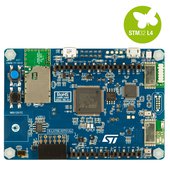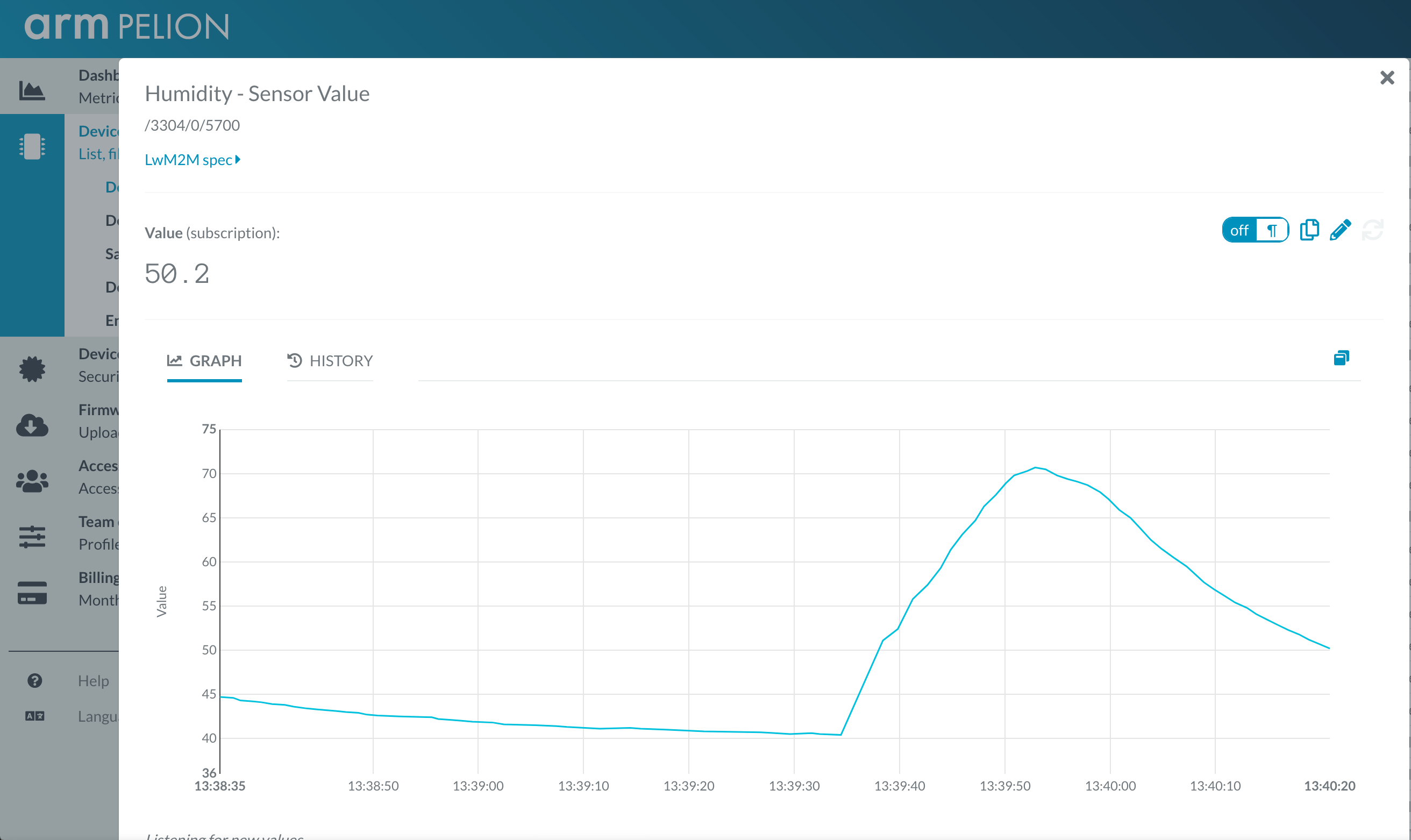Mbed OS and Pelion Device Management example over WIFI for DISCO_L475VG_IOT01 board
Dependencies: X_NUCLEO_COMMON ST_INTERFACES
DEPRECATED
This example application is not maintained and not recommended. It uses an old version of Mbed OS, Pelion DM and Arm toolchain. It doesn't work with Mbed Studio.
Please use: https://os.mbed.com/teams/mbed-os-examples/code/mbed-os-example-pelion/
This example is known to work on the following platforms:
- DISCO_L475E_IOT01A over WiFI and using onboard QSPI flash.

Follow the Quick-Start instructions: https://cloud.mbed.com/quick-start
Example functionality
This example showcases the following device functionality:
- Read onboard temperature and humidity sensors, and report them as Pelion LWM2M resources (see image below).
- On user button click, increment Pelion LWM2M button resource.
- Allow the user to change the state of the board LED from Pelion LWM2M led_state resource and PUT request.
- Uses all onboard sensors and reports them as Pelion LWM2M resources.

Use this example with Mbed CLI
1. Import the application into your desktop:
mbed import https://os.mbed.com/teams/ST/code/pelion-example-disco-iot01 cd pelion-example-disco-iot01
2. Install the CLOUD_SDK_API_KEY
mbed config -G CLOUD_SDK_API_KEY <PELION_DM_API_KEY>
For instructions on how to generate your API key, please see the documentation.
3. Initialize firmware credentials (done once per repository). You can use the following command:
mbed dm init -d "<your company name in Pelion DM>" --model-name "<product model identifier>" -q --force
If above command do not work for your Mbed CLI, please consider upgrading Mbed CLI to version 1.8.x or above.
4. Compile and program:
mbed compile -t <toolchain> -m DISCO_L475VG_IOT01A
(supported toolchains : GCC_ARM / ARM / IAR)
5. You can connect on a virtual terminal/COM port to the platform using:
mbed sterm -b 115200
This should give you an output similar to:
[BOOT] Mbed Bootloader [BOOT] ARM: 00000000000000000000 [BOOT] OEM: 00000000000000000000 [BOOT] Layout: 0 80096F4 [BOOT] Active firmware integrity check: [BOOT] SHA256: 0660E360D432225D5251461998FD8617B017098C5F1F90D5FB607BF8C27ED530 [BOOT] Version: 1553615309 [BOOT] Slot 0 is empty [BOOT] Active firmware up-to-date [BOOT] Application's start address: 0x8010400 [BOOT] Application's jump address: 0x8011041 [BOOT] Application's stack address: 0x20018000 [BOOT] Forwarding to application... Starting Simple Pelion Device Management Client example You can hold the user button during boot to format the storage and change the device identity. Sensors configuration: Invalid new address! HTS221 humidity & temperature = 0xBC LPS22HB pressure & temperature = 0xB1 LIS3MDL magnetometer = 0x3D LSM6DSL accelerometer & gyroscope = 0x6A Connecting to the network using Wifi... Connected to the network successfully. IP address: 192.168.1.3 Initializing Pelion Device Management Client... Initialized Pelion Client. Registering... Registered to Pelion Device Management. Endpoint Name: 0169********************001002d5 ADC temp: 23.0037 C, vref: 0.3661 V HTS221 temp: 28.700 C, humidity: 31.90 % LPS22HB temp: 29.600 C, pressure: 1032.01 mbar LIS3MDL mag: 0.217 x, -0.284 y, -0.053 z [gauss] LSM6DSL acc: 0.005 x, -0.014 y, 1.029 z [g] LSM6DSL gyro: 0.910 x, -0.910 y, 1.120 z [dps] VL53L0X dist: 1855 mm
sensors/HTS221/HTS221_driver.c
- Committer:
- chris
- Date:
- 2020-03-13
- Revision:
- 36:aaf44d2a6c33
- Parent:
- 18:a15bfe7aaebd
File content as of revision 36:aaf44d2a6c33:
/**
******************************************************************************
* @file HTS221_driver.c
* @author HESA Application Team
* @version V1.1
* @date 10-August-2016
* @brief HTS221 driver file
******************************************************************************
* @attention
*
* <h2><center>© COPYRIGHT(c) 2016 STMicroelectronics</center></h2>
*
* Redistribution and use in source and binary forms, with or without modification,
* are permitted provided that the following conditions are met:
* 1. Redistributions of source code must retain the above copyright notice,
* this list of conditions and the following disclaimer.
* 2. Redistributions in binary form must reproduce the above copyright notice,
* this list of conditions and the following disclaimer in the documentation
* and/or other materials provided with the distribution.
* 3. Neither the name of STMicroelectronics nor the names of its contributors
* may be used to endorse or promote products derived from this software
* without specific prior written permission.
*
* THIS SOFTWARE IS PROVIDED BY THE COPYRIGHT HOLDERS AND CONTRIBUTORS "AS IS"
* AND ANY EXPRESS OR IMPLIED WARRANTIES, INCLUDING, BUT NOT LIMITED TO, THE
* IMPLIED WARRANTIES OF MERCHANTABILITY AND FITNESS FOR A PARTICULAR PURPOSE ARE
* DISCLAIMED. IN NO EVENT SHALL THE COPYRIGHT HOLDER OR CONTRIBUTORS BE LIABLE
* FOR ANY DIRECT, INDIRECT, INCIDENTAL, SPECIAL, EXEMPLARY, OR CONSEQUENTIAL
* DAMAGES (INCLUDING, BUT NOT LIMITED TO, PROCUREMENT OF SUBSTITUTE GOODS OR
* SERVICES; LOSS OF USE, DATA, OR PROFITS; OR BUSINESS INTERRUPTION) HOWEVER
* CAUSED AND ON ANY THEORY OF LIABILITY, WHETHER IN CONTRACT, STRICT LIABILITY,
* OR TORT (INCLUDING NEGLIGENCE OR OTHERWISE) ARISING IN ANY WAY OUT OF THE USE
* OF THIS SOFTWARE, EVEN IF ADVISED OF THE POSSIBILITY OF SUCH DAMAGE.
*
******************************************************************************
*/
/* Includes ------------------------------------------------------------------*/
#include "HTS221_driver.h"
#ifdef __cplusplus
extern "C" {
#endif
#ifdef USE_FULL_ASSERT_HTS221
#include <stdio.h>
#endif
/** @addtogroup Environmental_Sensor
* @{
*/
/** @defgroup HTS221_DRIVER
* @brief HTS221 DRIVER
* @{
*/
/** @defgroup HTS221_Imported_Function_Prototypes
* @{
*/
extern uint8_t HTS221_io_write( void *handle, uint8_t WriteAddr, uint8_t *pBuffer, uint16_t nBytesToWrite );
extern uint8_t HTS221_io_read( void *handle, uint8_t ReadAddr, uint8_t *pBuffer, uint16_t nBytesToRead );
/**
* @}
*/
/** @defgroup HTS221_Private_Function_Prototypes
* @{
*/
/**
* @}
*/
/** @defgroup HTS221_Private_Functions
* @{
*/
/**
* @}
*/
/** @defgroup HTS221_Public_Functions
* @{
*/
/*******************************************************************************
* Function Name : HTS221_read_reg
* Description : Generic Reading function. It must be fullfilled with either
* : I2C or SPI reading functions
* Input : Register Address
* Output : Data Read
* Return : None
*******************************************************************************/
HTS221_Error_et HTS221_read_reg( void *handle, uint8_t RegAddr, uint16_t NumByteToRead, uint8_t *Data )
{
if ( NumByteToRead > 1 ) RegAddr |= 0x80;
if ( HTS221_io_read( handle, RegAddr, Data, NumByteToRead ) )
return HTS221_ERROR;
else
return HTS221_OK;
}
/*******************************************************************************
* Function Name : HTS221_write_reg
* Description : Generic Writing function. It must be fullfilled with either
* : I2C or SPI writing function
* Input : Register Address, Data to be written
* Output : None
* Return : None
*******************************************************************************/
HTS221_Error_et HTS221_write_reg( void *handle, uint8_t RegAddr, uint16_t NumByteToWrite, uint8_t *Data )
{
if ( NumByteToWrite > 1 ) RegAddr |= 0x80;
if ( HTS221_io_write( handle, RegAddr, Data, NumByteToWrite ) )
return HTS221_ERROR;
else
return HTS221_OK;
}
/**
* @brief Get the version of this driver.
* @param pxVersion pointer to a HTS221_DriverVersion_st structure that contains the version information.
* This parameter is a pointer to @ref HTS221_DriverVersion_st.
* @retval Error code [HTS221_OK, HTS221_ERROR].
*/
HTS221_Error_et HTS221_Get_DriverVersion(HTS221_DriverVersion_st* version)
{
version->Major = HTS221_DRIVER_VERSION_MAJOR;
version->Minor = HTS221_DRIVER_VERSION_MINOR;
version->Point = HTS221_DRIVER_VERSION_POINT;
return HTS221_OK;
}
/**
* @brief Get device type ID.
* @param *handle Device handle.
* @param deviceid pointer to the returned device type ID.
* @retval Error code [HTS221_OK, HTS221_ERROR].
*/
HTS221_Error_et HTS221_Get_DeviceID(void *handle, uint8_t* deviceid)
{
if(HTS221_read_reg(handle, HTS221_WHO_AM_I_REG, 1, deviceid))
return HTS221_ERROR;
return HTS221_OK;
}
/**
* @brief Initializes the HTS221 with the specified parameters in HTS221_Init_st struct.
* @param *handle Device handle.
* @param pxInit pointer to a HTS221_Init_st structure that contains the configuration.
* This parameter is a pointer to @ref HTS221_Init_st.
* @retval Error code [HTS221_OK, HTS221_ERROR].
*/
HTS221_Error_et HTS221_Set_InitConfig(void *handle, HTS221_Init_st* pxInit)
{
uint8_t buffer[3];
HTS221_assert_param(IS_HTS221_AVGH(pxInit->avg_h));
HTS221_assert_param(IS_HTS221_AVGT(pxInit->avg_t));
HTS221_assert_param(IS_HTS221_ODR(pxInit->odr));
HTS221_assert_param(IS_HTS221_State(pxInit->bdu_status));
HTS221_assert_param(IS_HTS221_State(pxInit->heater_status));
HTS221_assert_param(IS_HTS221_DrdyLevelType(pxInit->irq_level));
HTS221_assert_param(IS_HTS221_OutputType(pxInit->irq_output_type));
HTS221_assert_param(IS_HTS221_State(pxInit->irq_enable));
if(HTS221_read_reg(handle, HTS221_AV_CONF_REG, 1, buffer))
return HTS221_ERROR;
buffer[0] &= ~(HTS221_AVGH_MASK | HTS221_AVGT_MASK);
buffer[0] |= (uint8_t)pxInit->avg_h;
buffer[0] |= (uint8_t)pxInit->avg_t;
if(HTS221_write_reg(handle, HTS221_AV_CONF_REG, 1, buffer))
return HTS221_ERROR;
if(HTS221_read_reg(handle, HTS221_CTRL_REG1, 3, buffer))
return HTS221_ERROR;
buffer[0] &= ~(HTS221_BDU_MASK | HTS221_ODR_MASK);
buffer[0] |= (uint8_t)pxInit->odr;
buffer[0] |= ((uint8_t)pxInit->bdu_status) << HTS221_BDU_BIT;
buffer[1] &= ~HTS221_HEATHER_BIT;
buffer[1] |= ((uint8_t)pxInit->heater_status) << HTS221_HEATHER_BIT;
buffer[2] &= ~(HTS221_DRDY_H_L_MASK | HTS221_PP_OD_MASK | HTS221_DRDY_MASK);
buffer[2] |= ((uint8_t)pxInit->irq_level) << HTS221_DRDY_H_L_BIT;
buffer[2] |= (uint8_t)pxInit->irq_output_type;
buffer[2] |= ((uint8_t)pxInit->irq_enable) << HTS221_DRDY_BIT;
if(HTS221_write_reg(handle, HTS221_CTRL_REG1, 3, buffer))
return HTS221_ERROR;
return HTS221_OK;
}
/**
* @brief Returns a HTS221_Init_st struct with the actual configuration.
* @param *handle Device handle.
* @param pxInit pointer to a HTS221_Init_st structure.
* This parameter is a pointer to @ref HTS221_Init_st.
* @retval Error code [HTS221_OK, HTS221_ERROR].
*/
HTS221_Error_et HTS221_Get_InitConfig(void *handle, HTS221_Init_st* pxInit)
{
uint8_t buffer[3];
if(HTS221_read_reg(handle, HTS221_AV_CONF_REG, 1, buffer))
return HTS221_ERROR;
pxInit->avg_h = (HTS221_Avgh_et)(buffer[0] & HTS221_AVGH_MASK);
pxInit->avg_t = (HTS221_Avgt_et)(buffer[0] & HTS221_AVGT_MASK);
if(HTS221_read_reg(handle, HTS221_CTRL_REG1, 3, buffer))
return HTS221_ERROR;
pxInit->odr = (HTS221_Odr_et)(buffer[0] & HTS221_ODR_MASK);
pxInit->bdu_status = (HTS221_State_et)((buffer[0] & HTS221_BDU_MASK) >> HTS221_BDU_BIT);
pxInit->heater_status = (HTS221_State_et)((buffer[1] & HTS221_HEATHER_MASK) >> HTS221_HEATHER_BIT);
pxInit->irq_level = (HTS221_DrdyLevel_et)(buffer[2] & HTS221_DRDY_H_L_MASK);
pxInit->irq_output_type = (HTS221_OutputType_et)(buffer[2] & HTS221_PP_OD_MASK);
pxInit->irq_enable = (HTS221_State_et)((buffer[2] & HTS221_DRDY_MASK) >> HTS221_DRDY_BIT);
return HTS221_OK;
}
/**
* @brief De initialization function for HTS221.
* This function put the HTS221 in power down, make a memory boot and clear the data output flags.
* @param *handle Device handle.
* @retval Error code [HTS221_OK, HTS221_ERROR].
*/
HTS221_Error_et HTS221_DeInit(void *handle)
{
uint8_t buffer[4];
if(HTS221_read_reg(handle, HTS221_CTRL_REG1, 2, buffer))
return HTS221_ERROR;
/* HTS221 in power down */
buffer[0] |= 0x01 << HTS221_PD_BIT;
/* Make HTS221 boot */
buffer[1] |= 0x01 << HTS221_BOOT_BIT;
if(HTS221_write_reg(handle, HTS221_CTRL_REG1, 2, buffer))
return HTS221_ERROR;
/* Dump of data output */
if(HTS221_read_reg(handle, HTS221_HR_OUT_L_REG, 4, buffer))
return HTS221_ERROR;
return HTS221_OK;
}
/**
* @brief Read HTS221 output registers, and calculate humidity and temperature.
* @param *handle Device handle.
* @param humidity pointer to the returned humidity value that must be divided by 10 to get the value in [%].
* @param temperature pointer to the returned temperature value that must be divided by 10 to get the value in ['C].
* @retval Error code [HTS221_OK, HTS221_ERROR].
*/
HTS221_Error_et HTS221_Get_Measurement(void *handle, uint16_t* humidity, int16_t* temperature)
{
if ( HTS221_Get_Temperature( handle, temperature ) == HTS221_ERROR ) return HTS221_ERROR;
if ( HTS221_Get_Humidity( handle, humidity ) == HTS221_ERROR ) return HTS221_ERROR;
return HTS221_OK;
}
/**
* @brief Read HTS221 output registers. Humidity and temperature.
* @param *handle Device handle.
* @param humidity pointer to the returned humidity raw value.
* @param temperature pointer to the returned temperature raw value.
* @retval Error code [HTS221_OK, HTS221_ERROR].
*/
HTS221_Error_et HTS221_Get_RawMeasurement(void *handle, int16_t* humidity, int16_t* temperature)
{
uint8_t buffer[4];
if(HTS221_read_reg(handle, HTS221_HR_OUT_L_REG, 4, buffer))
return HTS221_ERROR;
*humidity = (int16_t)((((uint16_t)buffer[1]) << 8) | (uint16_t)buffer[0]);
*temperature = (int16_t)((((uint16_t)buffer[3]) << 8) | (uint16_t)buffer[2]);
return HTS221_OK;
}
/**
* @brief Read HTS221 Humidity output registers, and calculate humidity.
* @param *handle Device handle.
* @param Pointer to the returned humidity value that must be divided by 10 to get the value in [%].
* @retval Error code [HTS221_OK, HTS221_ERROR].
*/
HTS221_Error_et HTS221_Get_Humidity(void *handle, uint16_t* value)
{
int16_t H0_T0_out, H1_T0_out, H_T_out;
int16_t H0_rh, H1_rh;
uint8_t buffer[2];
float tmp_f;
if(HTS221_read_reg(handle, HTS221_H0_RH_X2, 2, buffer))
return HTS221_ERROR;
H0_rh = buffer[0] >> 1;
H1_rh = buffer[1] >> 1;
if(HTS221_read_reg(handle, HTS221_H0_T0_OUT_L, 2, buffer))
return HTS221_ERROR;
H0_T0_out = (((uint16_t)buffer[1]) << 8) | (uint16_t)buffer[0];
if(HTS221_read_reg(handle, HTS221_H1_T0_OUT_L, 2, buffer))
return HTS221_ERROR;
H1_T0_out = (((uint16_t)buffer[1]) << 8) | (uint16_t)buffer[0];
if(HTS221_read_reg(handle, HTS221_HR_OUT_L_REG, 2, buffer))
return HTS221_ERROR;
H_T_out = (((uint16_t)buffer[1]) << 8) | (uint16_t)buffer[0];
tmp_f = (float)(H_T_out - H0_T0_out) * (float)(H1_rh - H0_rh) / (float)(H1_T0_out - H0_T0_out) + H0_rh;
tmp_f *= 10.0f;
*value = ( tmp_f > 1000.0f ) ? 1000
: ( tmp_f < 0.0f ) ? 0
: ( uint16_t )tmp_f;
return HTS221_OK;
}
/**
* @brief Read HTS221 humidity output registers.
* @param *handle Device handle.
* @param Pointer to the returned humidity raw value.
* @retval Error code [HTS221_OK, HTS221_ERROR].
*/
HTS221_Error_et HTS221_Get_HumidityRaw(void *handle, int16_t* value)
{
uint8_t buffer[2];
if(HTS221_read_reg(handle, HTS221_HR_OUT_L_REG, 2, buffer))
return HTS221_ERROR;
*value = (int16_t)((((uint16_t)buffer[1]) << 8) | (uint16_t)buffer[0]);
return HTS221_OK;
}
/**
* @brief Read HTS221 temperature output registers, and calculate temperature.
* @param *handle Device handle.
* @param Pointer to the returned temperature value that must be divided by 10 to get the value in ['C].
* @retval Error code [HTS221_OK, HTS221_ERROR].
*/
HTS221_Error_et HTS221_Get_Temperature(void *handle, int16_t *value)
{
int16_t T0_out, T1_out, T_out, T0_degC_x8_u16, T1_degC_x8_u16;
int16_t T0_degC, T1_degC;
uint8_t buffer[4], tmp;
float tmp_f;
if(HTS221_read_reg(handle, HTS221_T0_DEGC_X8, 2, buffer))
return HTS221_ERROR;
if(HTS221_read_reg(handle, HTS221_T0_T1_DEGC_H2, 1, &tmp))
return HTS221_ERROR;
T0_degC_x8_u16 = (((uint16_t)(tmp & 0x03)) << 8) | ((uint16_t)buffer[0]);
T1_degC_x8_u16 = (((uint16_t)(tmp & 0x0C)) << 6) | ((uint16_t)buffer[1]);
T0_degC = T0_degC_x8_u16 >> 3;
T1_degC = T1_degC_x8_u16 >> 3;
if(HTS221_read_reg(handle, HTS221_T0_OUT_L, 4, buffer))
return HTS221_ERROR;
T0_out = (((uint16_t)buffer[1]) << 8) | (uint16_t)buffer[0];
T1_out = (((uint16_t)buffer[3]) << 8) | (uint16_t)buffer[2];
if(HTS221_read_reg(handle, HTS221_TEMP_OUT_L_REG, 2, buffer))
return HTS221_ERROR;
T_out = (((uint16_t)buffer[1]) << 8) | (uint16_t)buffer[0];
tmp_f = (float)(T_out - T0_out) * (float)(T1_degC - T0_degC) / (float)(T1_out - T0_out) + T0_degC;
tmp_f *= 10.0f;
*value = ( int16_t )tmp_f;
return HTS221_OK;
}
/**
* @brief Read HTS221 temperature output registers.
* @param *handle Device handle.
* @param Pointer to the returned temperature raw value.
* @retval Error code [HTS221_OK, HTS221_ERROR].
*/
HTS221_Error_et HTS221_Get_TemperatureRaw(void *handle, int16_t* value)
{
uint8_t buffer[2];
if(HTS221_read_reg(handle, HTS221_TEMP_OUT_L_REG, 2, buffer))
return HTS221_ERROR;
*value = (int16_t)((((uint16_t)buffer[1]) << 8) | (uint16_t)buffer[0]);
return HTS221_OK;
}
/**
* @brief Get the availability of new data for humidity and temperature.
* @param *handle Device handle.
* @param humidity pointer to the returned humidity data status [HTS221_SET/HTS221_RESET].
* @param temperature pointer to the returned temperature data status [HTS221_SET/HTS221_RESET].
* This parameter is a pointer to @ref HTS221_BitStatus_et.
* @retval Error code [HTS221_OK, HTS221_ERROR].
*/
HTS221_Error_et HTS221_Get_DataStatus(void *handle, HTS221_BitStatus_et* humidity, HTS221_BitStatus_et* temperature)
{
uint8_t tmp;
if(HTS221_read_reg(handle, HTS221_STATUS_REG, 1, &tmp))
return HTS221_ERROR;
*humidity = (HTS221_BitStatus_et)((tmp & HTS221_HDA_MASK) >> HTS221_H_DA_BIT);
*temperature = (HTS221_BitStatus_et)(tmp & HTS221_TDA_MASK);
return HTS221_OK;
}
/**
* @brief Exit from power down mode.
* @param *handle Device handle.
* @param void.
* @retval Error code [HTS221_OK, HTS221_ERROR].
*/
HTS221_Error_et HTS221_Activate(void *handle)
{
uint8_t tmp;
if(HTS221_read_reg(handle, HTS221_CTRL_REG1, 1, &tmp))
return HTS221_ERROR;
tmp |= HTS221_PD_MASK;
if(HTS221_write_reg(handle, HTS221_CTRL_REG1, 1, &tmp))
return HTS221_ERROR;
return HTS221_OK;
}
/**
* @brief Put the sensor in power down mode.
* @param *handle Device handle.
* @retval Error code [HTS221_OK, HTS221_ERROR].
*/
HTS221_Error_et HTS221_DeActivate(void *handle)
{
uint8_t tmp;
if(HTS221_read_reg(handle, HTS221_CTRL_REG1, 1, &tmp))
return HTS221_ERROR;
tmp &= ~HTS221_PD_MASK;
if(HTS221_write_reg(handle, HTS221_CTRL_REG1, 1, &tmp))
return HTS221_ERROR;
return HTS221_OK;
}
/**
* @brief Check if the single measurement has completed.
* @param *handle Device handle.
* @param tmp is set to 1, when the measure is completed
* @retval Status [HTS221_ERROR, HTS221_OK]
*/
HTS221_Error_et HTS221_IsMeasurementCompleted(void *handle, HTS221_BitStatus_et* Is_Measurement_Completed)
{
uint8_t tmp;
if(HTS221_read_reg(handle, HTS221_STATUS_REG, 1, &tmp))
return HTS221_ERROR;
if((tmp & (uint8_t)(HTS221_HDA_MASK | HTS221_TDA_MASK)) == (uint8_t)(HTS221_HDA_MASK | HTS221_TDA_MASK))
*Is_Measurement_Completed = HTS221_SET;
else
*Is_Measurement_Completed = HTS221_RESET;
return HTS221_OK;
}
/**
* @brief Set_ humidity and temperature average mode.
* @param *handle Device handle.
* @param avgh is the average mode for humidity, this parameter is @ref HTS221_Avgh_et.
* @param avgt is the average mode for temperature, this parameter is @ref HTS221_Avgt_et.
* @retval Error code [HTS221_OK, HTS221_ERROR].
*/
HTS221_Error_et HTS221_Set_AvgHT(void *handle, HTS221_Avgh_et avgh, HTS221_Avgt_et avgt)
{
uint8_t tmp;
HTS221_assert_param(IS_HTS221_AVGH(avgh));
HTS221_assert_param(IS_HTS221_AVGT(avgt));
if(HTS221_read_reg(handle, HTS221_AV_CONF_REG, 1, &tmp))
return HTS221_ERROR;
tmp &= ~(HTS221_AVGH_MASK | HTS221_AVGT_MASK);
tmp |= (uint8_t)avgh;
tmp |= (uint8_t)avgt;
if(HTS221_write_reg(handle, HTS221_AV_CONF_REG, 1, &tmp))
return HTS221_ERROR;
return HTS221_OK;
}
/**
* @brief Set humidity average mode.
* @param *handle Device handle.
* @param avgh is the average mode for humidity, this parameter is @ref HTS221_Avgh_et.
* @retval Error code [HTS221_OK, HTS221_ERROR].
*/
HTS221_Error_et HTS221_Set_AvgH(void *handle, HTS221_Avgh_et avgh)
{
uint8_t tmp;
HTS221_assert_param(IS_HTS221_AVGH(avgh));
if(HTS221_read_reg(handle, HTS221_AV_CONF_REG, 1, &tmp))
return HTS221_ERROR;
tmp &= ~HTS221_AVGH_MASK;
tmp |= (uint8_t)avgh;
if(HTS221_write_reg(handle, HTS221_AV_CONF_REG, 1, &tmp))
return HTS221_ERROR;
return HTS221_OK;
}
/**
* @brief Set temperature average mode.
* @param *handle Device handle.
* @param avgt is the average mode for temperature, this parameter is @ref HTS221_Avgt_et.
* @retval Error code [HTS221_OK, HTS221_ERROR].
*/
HTS221_Error_et HTS221_Set_AvgT(void *handle, HTS221_Avgt_et avgt)
{
uint8_t tmp;
HTS221_assert_param(IS_HTS221_AVGT(avgt));
if(HTS221_read_reg(handle, HTS221_AV_CONF_REG, 1, &tmp))
return HTS221_ERROR;
tmp &= ~HTS221_AVGT_MASK;
tmp |= (uint8_t)avgt;
if(HTS221_write_reg(handle, HTS221_AV_CONF_REG, 1, &tmp))
return HTS221_ERROR;
return HTS221_OK;
}
/**
* @brief Get humidity and temperature average mode.
* @param *handle Device handle.
* @param avgh pointer to the returned value with the humidity average mode.
* @param avgt pointer to the returned value with the temperature average mode.
* @retval Error code [HTS221_OK, HTS221_ERROR].
*/
HTS221_Error_et HTS221_Get_AvgHT(void *handle, HTS221_Avgh_et* avgh, HTS221_Avgt_et* avgt)
{
uint8_t tmp;
if(HTS221_read_reg(handle, HTS221_AV_CONF_REG, 1, &tmp))
return HTS221_ERROR;
*avgh = (HTS221_Avgh_et)(tmp & HTS221_AVGH_MASK);
*avgt = (HTS221_Avgt_et)(tmp & HTS221_AVGT_MASK);
return HTS221_OK;
}
/**
* @brief Set block data update mode.
* @param *handle Device handle.
* @param status can be HTS221_ENABLE: enable the block data update, output data registers are updated once both MSB and LSB are read.
* @param status can be HTS221_DISABLE: output data registers are continuously updated.
* This parameter is a @ref HTS221_BitStatus_et.
* @retval Error code [HTS221_OK, HTS221_ERROR].
*/
HTS221_Error_et HTS221_Set_BduMode(void *handle, HTS221_State_et status)
{
uint8_t tmp;
HTS221_assert_param(IS_HTS221_State(status));
if(HTS221_read_reg(handle, HTS221_CTRL_REG1, 1, &tmp))
return HTS221_ERROR;
tmp &= ~HTS221_BDU_MASK;
tmp |= ((uint8_t)status) << HTS221_BDU_BIT;
if(HTS221_write_reg(handle, HTS221_CTRL_REG1, 1, &tmp))
return HTS221_ERROR;
return HTS221_OK;
}
/**
* @brief Get block data update mode.
* @param *handle Device handle.
* @param Pointer to the returned value with block data update mode status.
* @retval Error code [HTS221_OK, HTS221_ERROR].
*/
HTS221_Error_et HTS221_Get_BduMode(void *handle, HTS221_State_et* status)
{
uint8_t tmp;
if(HTS221_read_reg(handle, HTS221_CTRL_REG1, 1, &tmp))
return HTS221_ERROR;
*status = (HTS221_State_et)((tmp & HTS221_BDU_MASK) >> HTS221_BDU_BIT);
return HTS221_OK;
}
/**
* @brief Enter or exit from power down mode.
* @param *handle Device handle.
* @param status can be HTS221_SET: HTS221 in power down mode.
* @param status can be HTS221_REET: HTS221 in active mode.
* This parameter is a @ref HTS221_BitStatus_et.
* @retval Error code [HTS221_OK, HTS221_ERROR].
*/
HTS221_Error_et HTS221_Set_PowerDownMode(void *handle, HTS221_BitStatus_et status)
{
uint8_t tmp;
HTS221_assert_param(IS_HTS221_BitStatus(status));
if(HTS221_read_reg(handle, HTS221_CTRL_REG1, 1, &tmp))
return HTS221_ERROR;
tmp &= ~HTS221_PD_MASK;
tmp |= ((uint8_t)status) << HTS221_PD_BIT;
if(HTS221_write_reg(handle, HTS221_CTRL_REG1, 1, &tmp))
return HTS221_ERROR;
return HTS221_OK;
}
/**
* @brief Get if HTS221 is in active mode or in power down mode.
* @param *handle Device handle.
* @param Pointer to the returned value with HTS221 status.
* @retval Error code [HTS221_OK, HTS221_ERROR].
*/
HTS221_Error_et HTS221_Get_PowerDownMode(void *handle, HTS221_BitStatus_et* status)
{
uint8_t tmp;
if(HTS221_read_reg(handle, HTS221_CTRL_REG1, 1, &tmp))
return HTS221_ERROR;
*status = (HTS221_BitStatus_et)((tmp & HTS221_PD_MASK) >> HTS221_PD_BIT);
return HTS221_OK;
}
/**
* @brief Set the output data rate mode.
* @param *handle Device handle.
* @param odr is the output data rate mode.
* This parameter is a @ref HTS221_Odr_et.
* @retval Error code [HTS221_OK, HTS221_ERROR].
*/
HTS221_Error_et HTS221_Set_Odr(void *handle, HTS221_Odr_et odr)
{
uint8_t tmp;
HTS221_assert_param(IS_HTS221_ODR(odr));
if(HTS221_read_reg(handle, HTS221_CTRL_REG1, 1, &tmp))
return HTS221_ERROR;
tmp &= ~HTS221_ODR_MASK;
tmp |= (uint8_t)odr;
if(HTS221_write_reg(handle, HTS221_CTRL_REG1, 1, &tmp))
return HTS221_ERROR;
return HTS221_OK;
}
/**
* @brief Get the output data rate mode.
* @param *handle Device handle.
* @param Pointer to the returned value with output data rate mode.
* @retval Error code [HTS221_OK, HTS221_ERROR].
*/
HTS221_Error_et HTS221_Get_Odr(void *handle, HTS221_Odr_et* odr)
{
uint8_t tmp;
if(HTS221_read_reg(handle, HTS221_CTRL_REG1, 1, &tmp))
return HTS221_ERROR;
tmp &= HTS221_ODR_MASK;
*odr = (HTS221_Odr_et)tmp;
return HTS221_OK;
}
/**
* @brief Reboot Memory Content.
* @param *handle Device handle.
* @retval Error code [HTS221_OK, HTS221_ERROR].
*/
HTS221_Error_et HTS221_MemoryBoot(void *handle)
{
uint8_t tmp;
if(HTS221_read_reg(handle, HTS221_CTRL_REG2, 1, &tmp))
return HTS221_ERROR;
tmp |= HTS221_BOOT_MASK;
if(HTS221_write_reg(handle, HTS221_CTRL_REG2, 1, &tmp))
return HTS221_ERROR;
return HTS221_OK;
}
/**
* @brief Configure the internal heater.
* @param *handle Device handle.
* @param The status of the internal heater [HTS221_ENABLE/HTS221_DISABLE].
* This parameter is a @ref HTS221_State_et.
* @retval Error code [HTS221_OK, HTS221_ERROR]
*/
HTS221_Error_et HTS221_Set_HeaterState(void *handle, HTS221_State_et status)
{
uint8_t tmp;
HTS221_assert_param(IS_HTS221_State(status));
if(HTS221_read_reg(handle, HTS221_CTRL_REG2, 1, &tmp))
return HTS221_ERROR;
tmp &= ~HTS221_HEATHER_MASK;
tmp |= ((uint8_t)status) << HTS221_HEATHER_BIT;
if(HTS221_write_reg(handle, HTS221_CTRL_REG2, 1, &tmp))
return HTS221_ERROR;
return HTS221_OK;
}
/**
* @brief Get the internal heater.
* @param *handle Device handle.
* @param Pointer to the returned status of the internal heater [HTS221_ENABLE/HTS221_DISABLE].
* @retval Error code [HTS221_OK, HTS221_ERROR].
*/
HTS221_Error_et HTS221_Get_HeaterState(void *handle, HTS221_State_et* status)
{
uint8_t tmp;
if(HTS221_read_reg(handle, HTS221_CTRL_REG2, 1, &tmp))
return HTS221_ERROR;
*status = (HTS221_State_et)((tmp & HTS221_HEATHER_MASK) >> HTS221_HEATHER_BIT);
return HTS221_OK;
}
/**
* @brief Set ONE_SHOT bit to start a new conversion (ODR mode has to be 00).
* Once the measurement is done, ONE_SHOT bit is self-cleared.
* @param *handle Device handle.
* @retval Error code [HTS221_OK, HTS221_ERROR].
*/
HTS221_Error_et HTS221_StartOneShotMeasurement(void *handle)
{
uint8_t tmp;
if(HTS221_read_reg(handle, HTS221_CTRL_REG2, 1, &tmp))
return HTS221_ERROR;
tmp |= HTS221_ONE_SHOT_MASK;
if(HTS221_write_reg(handle, HTS221_CTRL_REG2, 1, &tmp))
return HTS221_ERROR;
return HTS221_OK;
}
/**
* @brief Set level configuration of the interrupt pin DRDY.
* @param *handle Device handle.
* @param status can be HTS221_LOW_LVL: active level is LOW.
* @param status can be HTS221_HIGH_LVL: active level is HIGH.
* This parameter is a @ref HTS221_State_et.
* @retval Error code [HTS221_OK, HTS221_ERROR].
*/
HTS221_Error_et HTS221_Set_IrqActiveLevel(void *handle, HTS221_DrdyLevel_et value)
{
uint8_t tmp;
HTS221_assert_param(IS_HTS221_DrdyLevelType(value));
if(HTS221_read_reg(handle, HTS221_CTRL_REG3, 1, &tmp))
return HTS221_ERROR;
tmp &= ~HTS221_DRDY_H_L_MASK;
tmp |= (uint8_t)value;
if(HTS221_write_reg(handle, HTS221_CTRL_REG3, 1, &tmp))
return HTS221_ERROR;
return HTS221_OK;
}
/**
* @brief Get level configuration of the interrupt pin DRDY.
* @param *handle Device handle.
* @param Pointer to the returned status of the level configuration [HTS221_ENABLE/HTS221_DISABLE].
* @retval Error code [HTS221_OK, HTS221_ERROR].
*/
HTS221_Error_et HTS221_Get_IrqActiveLevel(void *handle, HTS221_DrdyLevel_et* value)
{
uint8_t tmp;
if(HTS221_read_reg(handle, HTS221_CTRL_REG3, 1, &tmp))
return HTS221_ERROR;
*value = (HTS221_DrdyLevel_et)(tmp & HTS221_DRDY_H_L_MASK);
return HTS221_OK;
}
/**
* @brief Set Push-pull/open drain configuration for the interrupt pin DRDY.
* @param *handle Device handle.
* @param value is the output type configuration.
* This parameter is a @ref HTS221_OutputType_et.
* @retval Error code [HTS221_OK, HTS221_ERROR].
*/
HTS221_Error_et HTS221_Set_IrqOutputType(void *handle, HTS221_OutputType_et value)
{
uint8_t tmp;
HTS221_assert_param(IS_HTS221_OutputType(value));
if(HTS221_read_reg(handle, HTS221_CTRL_REG3, 1, &tmp))
return HTS221_ERROR;
tmp &= ~HTS221_PP_OD_MASK;
tmp |= (uint8_t)value;
if(HTS221_write_reg(handle, HTS221_CTRL_REG3, 1, &tmp))
return HTS221_ERROR;
return HTS221_OK;
}
/**
* @brief Get the configuration for the interrupt pin DRDY.
* @param *handle Device handle.
* @param Pointer to the returned value with output type configuration.
* @retval Error code [HTS221_OK, HTS221_ERROR].
*/
HTS221_Error_et HTS221_Get_IrqOutputType(void *handle, HTS221_OutputType_et* value)
{
uint8_t tmp;
if(HTS221_read_reg(handle, HTS221_CTRL_REG3, 1, &tmp))
return HTS221_ERROR;
*value = (HTS221_OutputType_et)(tmp & HTS221_PP_OD_MASK);
return HTS221_OK;
}
/**
* @brief Enable/disable the interrupt mode.
* @param *handle Device handle.
* @param status is the enable/disable for the interrupt mode.
* This parameter is a @ref HTS221_State_et.
* @retval Error code [HTS221_OK, HTS221_ERROR].
*/
HTS221_Error_et HTS221_Set_IrqEnable(void *handle, HTS221_State_et status)
{
uint8_t tmp;
HTS221_assert_param(IS_HTS221_State(status));
if(HTS221_read_reg(handle, HTS221_CTRL_REG3, 1, &tmp))
return HTS221_ERROR;
tmp &= ~HTS221_DRDY_MASK;
tmp |= ((uint8_t)status) << HTS221_DRDY_BIT;
if(HTS221_write_reg(handle, HTS221_CTRL_REG3, 1, &tmp))
return HTS221_ERROR;
return HTS221_OK;
}
/**
* @brief Get the interrupt mode.
* @param *handle Device handle.
* @param Pointer to the returned status of the interrupt mode configuration [HTS221_ENABLE/HTS221_DISABLE].
* @retval Error code [HTS221_OK, HTS221_ERROR].
*/
HTS221_Error_et HTS221_Get_IrqEnable(void *handle, HTS221_State_et* status)
{
uint8_t tmp;
if(HTS221_read_reg(handle, HTS221_CTRL_REG3, 1, &tmp))
return HTS221_ERROR;
*status = (HTS221_State_et)((tmp & HTS221_DRDY_MASK) >> HTS221_DRDY_BIT);
return HTS221_OK;
}
#ifdef USE_FULL_ASSERT_HTS221
/**
* @brief Reports the name of the source file and the source line number
* where the assert_param error has occurred.
* @param file: pointer to the source file name
* @param line: assert_param error line source number
* @retval : None
*/
void HTS221_assert_failed(uint8_t* file, uint32_t line)
{
/* User can add his own implementation to report the file name and line number */
printf("Wrong parameters value: file %s on line %d\r\n", file, (int)line);
/* Infinite loop */
while (1)
{
}
}
#endif
#ifdef __cplusplus
}
#endif
/**
* @}
*/
/**
* @}
*/
/**
* @}
*/
/******************* (C) COPYRIGHT 2013 STMicroelectronics *****END OF FILE****/

